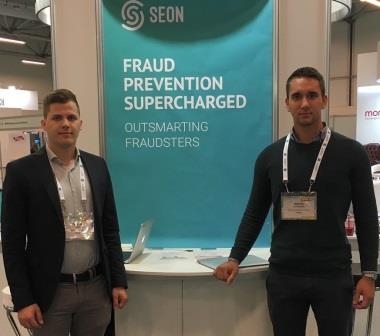By Ronen Shnidman
SEON is a Europe-based fraud prevention startup headquartered in Budapest that is focused on serving merchants of all sizes. The company was co-founded in 2015 by two bitcoin enthusiasts, Tamas Kadar and Bence Jendruszak, who were originally focused on the high level of fraud affecting a bitcoin exchange. They have expanded the company rapidly to include many rich data sources for determining fraud risk and now include major airlines and gaming companies in Europe as their clients. About-Fraud.com discusses below SEON’s experiences and plans as a young fraud prevention startup with company co-founder and business operations manager Bence Jendruszak following their appearance at Money 20/20 Europe.
RS: What led you and Tamas to become fraud solution entrepreneurs?
BJ: Tamas and I are both bitcoin enthusiasts and we watched as fraud patterns developed over the past couple of years at a bitcoin exchange at which we worked that was dealing with a high chargeback rate. That is what led us into fraud prevention solutions. This year we successfully raised seed-round investment and have already grown to eight employees.
RS: What part of the fraud ecosystem do you serve?
BJ: We are primarily focused on Europe but our solution is suitable for other geographic markets. Some of our current clients include KLM, Air France, Barion Payment and EuroBet.
Our approach of a light-touch integration with extensive functionality overcomes the biggest hurdle merchants’ face with our competitors’ solutions. Some startups are currently focused on serving acquirers and therefore work with much less data than SEON. We put great effort into our data enrichment capabilities using things like IP-based proxy/VPN/Tor detection, device fingerprinting, BIN checking and email-based social media profiling to determine and reduce fraud risk. In return, we ask clients to pay a micro-fee for each API call they make.
Other fraud management companies, tackle the problem with a different business model by offering merchants a 100% chargeback guarantee. However, that means in practice that they are asking merchants to pay between 1% and 4% of gross revenue in fees per transaction checked.
RS: What’s the biggest hurdle you face in getting clients?
BJ: Our biggest obstacle is convincing every stakeholder in the decision-making process. Fraud managers and risk analysts are easy to win over but they aren’t the ones making the decisions at the end of the day. Therefore, we offer a free trial period where the merchants have the option to A/B test our system, so all stakeholders can clearly see the added value of the solution by the time the trial is over.
RS: What sort of product do you provide clients?
BJ: All of our solutions are based on APIs [application programming interfaces] and we have put a great focus on an easy and smooth integration from day one. Our end-to-end solution consists of one single API, making it really easy to implement. We also have an easy-to-use admin panel that can be used to manage manual transaction review.
As far as the future is concerned, we think there is a large potential for blockchain technology to find its way into fraud prevention. We are already mapping out a potential blockchain-based fraud prevention solution and are laying out a vision in order to implement this into our long-term software development roadmap.
About-Fraud.com’s Money 20/20 Europe interviews are sponsored by identity information provider PIPL. To learn more about the data and identity resolution tools supplied by PIPL go to https://pipl.com/corp/.

